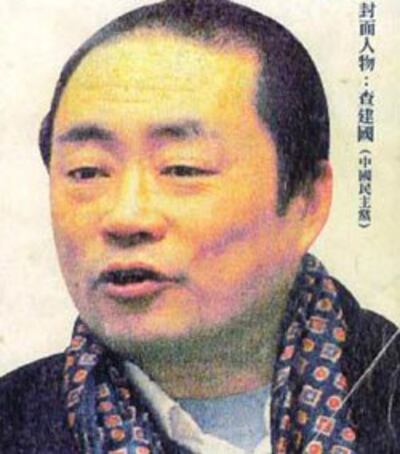
HONG KONG—Ten years after hehelped to found the first serious attempt at an opposition party inChina under Communist Party rule, Zha Jianguo is out of jail, vowing to ignorepolice constraints against him and keep appealing his sentence for"incitement to subvert state power."
"I told them when they let me go that I would continue to appeal mysentence because I felt that this was a miscarriage of justice," Zha saidin his first public interview since his release on Saturday.
"That is my right as a citizen. So I intend to continue to pursue this asa wrong case against me, and appeal to have my name cleared and to have thecase against me overturned."
Zha, who served a nine-year jail term for helping to found the China DemocracyParty (CDP) in 1998, during a period of relative political openness known asthe "second Beijing spring," said police had also set restrictions onhim because his sentence included two years'deprivation of political rights.
"The day they let me go, they dispatched cars from the city and district Public Security bureaux to pick me up from jail and take me to the localpolice station," Zha said.
"Once inside the police station, they issued me with a warning, which theyvideotaped. They told me that during the period of deprivation of my politicalrights that I wasn't allowed to give any interviews to foreign reporters, andthat if I wanted to go anywhere I had to ask for leave from them," headded.
Different treatment
But Zha, one of the first people to serve as chairman of the now-banned CDP anddeputy head of the party's Beijing and Tianjin chapter, said he had alreadytold the authorities back in the prison that he wouldn't recognize suchrestrictions.
"I told them I didn't accept any of the curbs they had in mind for me, and thatI wouldn't comply with any of it," he said. "Of course, if theywanted to take steps to keep foreign journalists away from me then that wouldbe up to them to see if they could."
He described his time in prison as "an opportunity" and a form ofretreat, and "an education like no other."
He said his democratic ideals were unaffected by his time inside, where he wastreated worse than fellow prisoners because he had refused to confess.
"The authorities treat you very differently if you have never confessed toyour crime, as if you are not like the other inmates, and I had never confessedto my crime," Zha said, who said he was simply acting on the rights of citizensas enshrined in China's Constitution.
"For example, if some of the other inmates were allowed to meet up and eata meal with their family every two or three months or so, you would not beallowed to eat with them; other inmates were also allowed to phone home once amonth but I wasn't. Other inmates were given parole, but I wasn't. That's theway it was," he said.
UN rights covenant
He said he and fellow activists back in 1998 set up the CDP because they wantedto test out China's signing of the United Nations covenant on civil andpolitical rights.
But by December 1998, three key figures of the movement—Xu Wenli, Wang Youcai,and Qin Yongmin—were being tried and sentenced to lengthy prison terms.
CDP branches and committees had been set up in more than 20 provinces, and thearrest and jailing of CDP supporters continued well into 2000. More than 30current or former CDP members remain in prison or in reeducation-through-laborcamps.
Original reporting in Mandarin by Xin Yu.Translated and written for the Web in English by Luisetta Mudie. Edited byMandarin service director Jennifer Chou and Sarah Jackson-Han.
